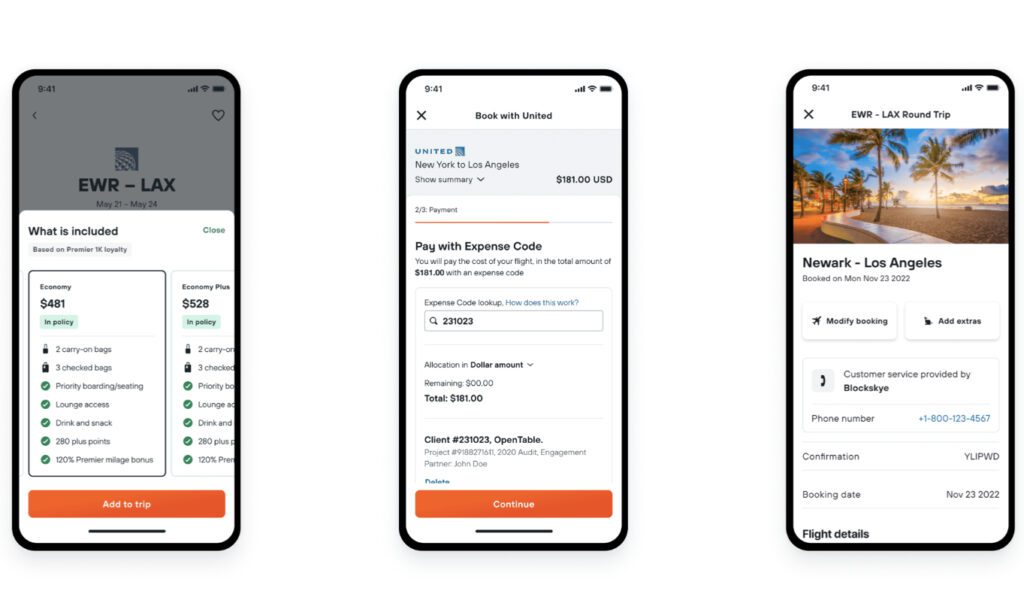Kayak Tries a Corporate Travel Side Hustle for Big Businesses

Skift Take
Kayak, the travel price-comparison service, on Tuesday debuted a corporate travel service for large companies.
Kayak's move does not reflect a major strategy shift. Yet the relative ease at which the consumer business created a corporate travel offering suggests that long-hyped concepts like blockchain may be leveling the playing field in a sector dominated by a handful of large players.
The product originated when PwC came to Kayak looking for help managing its corporate travel program.
Kayak provided its user interface and its supply — with more than 2,000 supplier connections. It teamed with Blockskye, a startup that provides distributed ledger technology for back-end services, especially connecting data for booking, payment, expense, authorization, and settlement.
PwC employees have now, for a few months, been booking some business trips using Kayak. When searching, they only see results from PwC-approved hotels and airlines and fare types, such as economy class. If a flight is canceled, a road warrior can rebook it, and all records will be updated accordingly — avoiding a need for error-prone reconciliation among different systems later.
"Users don't have to file expense reports, and they don't need a credit card to make their bookings, which is pretty awesome," said Kayak CEO Steve Hafner. "Regardless of where the booking is made, direct from a supplier or indirect from an agency, they get all their loyalty points."
Travelers can change their plans on the Kayak app, via Blockskye's customer support, or soon directly with the airline or hotel via the app.

Expanding the Business Travel Play
This isn't Kayak's first move in business travel. In 2020, Kayak launched a travel booking solution for small and mid-size businesses. This free service offered basic travel management, such as letting companies set policies about what kind of travel is approved.
It now claims 30,000 customers.
One critique Skift noted in 2021 about the service was its lack of customer service support.
Kayak said it would soon address that issue by offering a $20-a-month version that includes customer service support.
The enterprise version comes with a higher cost. Pricing varies depending on the customization required by each client. However, Kayak said it reduces some costs by offering optional direct connectivity with suppliers at lower fees, reduces merchant fees through alternative forms of payment, and allows more dynamic procurement through corporate bundled fares.
Metasearch isn't an obvious player in corporate travel. As Skift has noted before: "Ask a company travel manager for their biggest gripe, and they’ll likely say it’s employees who waste time trying to find a cheaper ticket, or room night, rather than go with the price showing up on the company’s online booking tool."
But Hafner believes a compelling user interface that overcomes key friction points will coax road warriors into complying with their company policies. A lack of compliance is a major problem at some corporations — though blaming the employees sometimes like an all-purpose excuse for poorly designed travel management programs.
Tech Driving Competition?
For decades, people have talked about reinventing corporate travel. So Hafner said he's approaching this product with very modest expectations. It's a test. If it spreads by word of mouth and picks up a few enterprise clients, that would count as a success in his book.
"In the grand scheme of things, this a pretty light lift for us," said Hafner.
The effort has involved about 20 software developers, along with 5 to 10 commercial marketers, out of Kayak's headcount of over 1,000. The company doesn't plan a heavy sales push for this.
"Having a good product isn't enough, honestly, because it's a long sales cycle," Hafner said. "Relationships matter a lot, and people have to make money at it."
But new technologies like blockchain and industry distribution efforts like the new distribution capability (essentially an effort to support direct airline sales) may be revving up the sector's competitiveness.
Kayak's product claims to offer direct content from all the major U.S. airlines using the new distribution capability protocol, which can provide more favorable commercial terms to airlines and provide the same bundles of products (seats plus amenities and perks) to business travel shoppers as what leisure travel shoppers see on airline sites.
Kayak integrates directly with the airline's data feeds which offers the best coverage of content and pricing. For its first enterprise client, it taps into the the so-called new distribution capability, or "direct" content, from American Airlines, United, and Southwest.
"You've got the legacy companies like Amex GBT, Concur, and the others who don't have the greatest products, but they're getting better, and they've got existing relationships," Hafner said. "Then on the other side, you've got travel firms like Navan and others who have better products but are scratching and clawing to get clients and are largely doing it from the point of view of being really unprofitable."
"My team is telling me that our product will become a really big business, but I'm not betting the farm on it," Hafner said.





